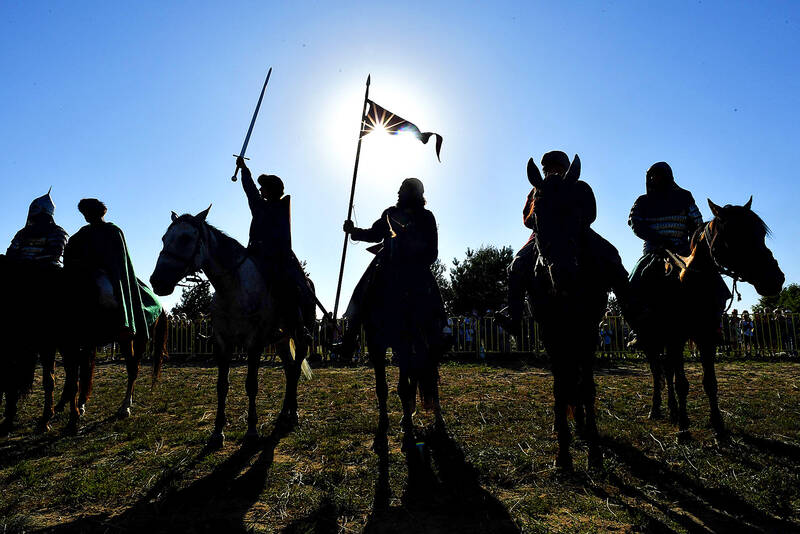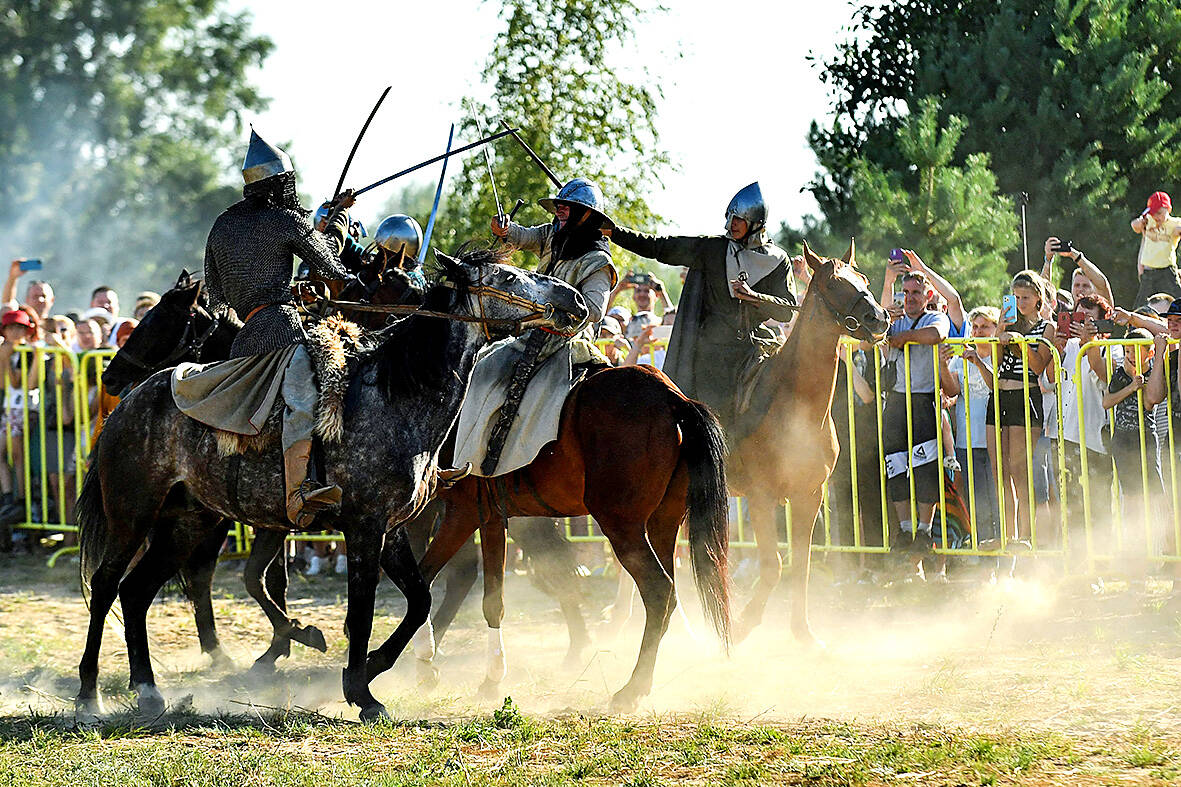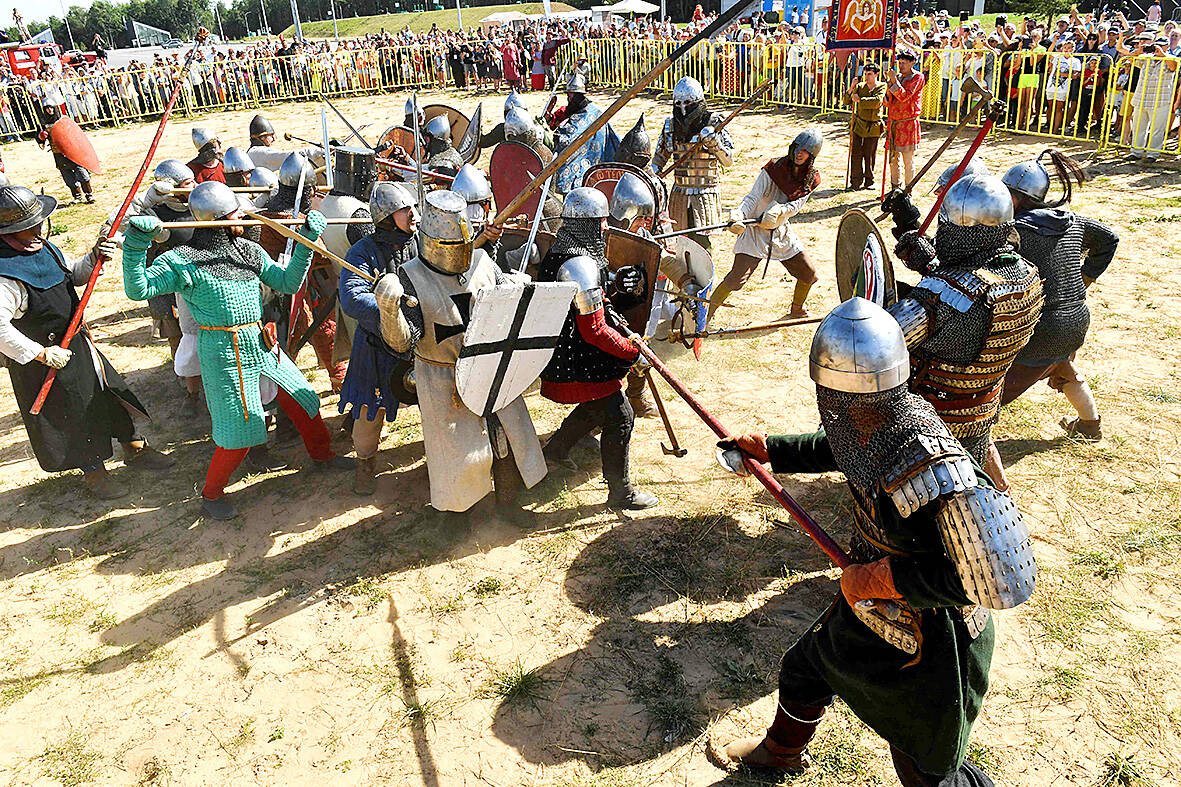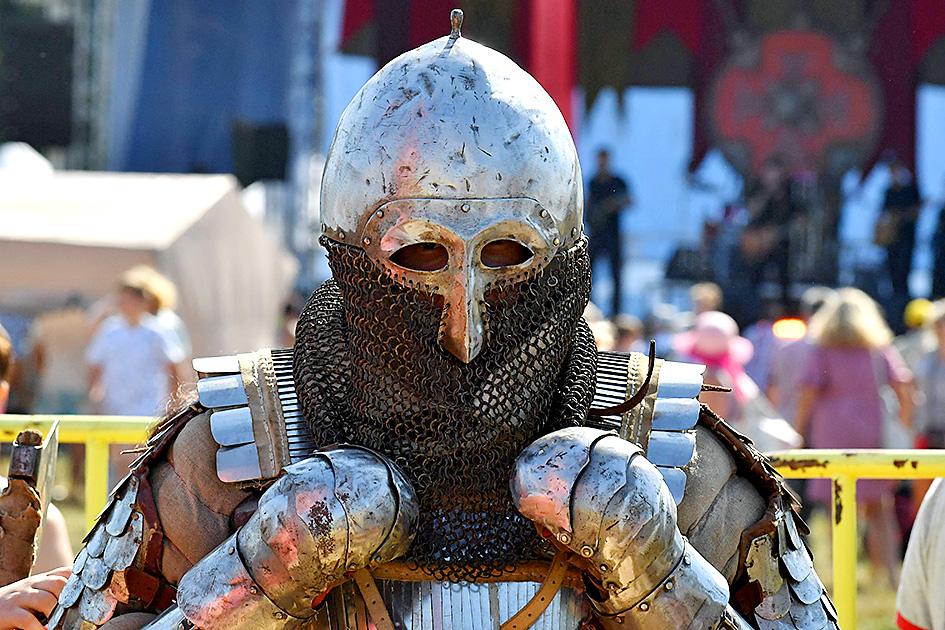Surrounded by dozens of men in chainmail and helmets playing dead in a field, an impersonator of medieval Russian prince Alexander Nevsky raises his sword and roars.
“This land is Russian, always has been, and always will be!”
It was on this spot near Lake Peipus on Russia’s border with Estonia that eight centuries ago Nevsky repelled a force of Teutonic Knights who wanted to convert Russia to Catholicism.

Photo: AFP
Known as the Battle of the Ice because it was fought largely on the frozen lake, the clash in April 1242 is celebrated as a great victory against efforts to turn Russia away from Eastern Orthodox Christianity.
For the hundreds of history enthusiasts re-enacting the battle on a recent August day, that victory is especially resonant today, as Russian forces wage an offensive in Ukraine framed by the Kremlin as part of an enduring conflict with the West.
“We are fighting against Europe just like our ancestors did,” says Oleg Yakontov, a 56-year-old retired paratrooper, holding a sword and shield as sweat drips off his face.

Photo: AFP
Historical re-enactments are a popular pastime in Russia, whether of medieval battles, Napoleonic-era clashes or the fierce fighting of World War II.
Drawing parallels with that history — and with President Vladimir Putin as a kind of successor to figures like Nevsky — is part of the messaging put forward by the Kremlin and Russian state media in support of Moscow’s campaign in Ukraine.
“To me, Nevsky symbolizes the defense of the Motherland and victory,” says 23-year-old Vladislav Vasilyev, still out of breath after taking part in the re-enactment.

Photo: AFP
Several hundred people gathered for the mock battle near the lake, called Lake Chud in Russian. They feasted on grilled meat and listened to live rock music as the combatants pummeled each other on the field.
The event culminated in horseback combat demonstrations a few meters away from a large metal sculpture of Nevsky that was inaugurated last September by Putin and Patriarch Kirill, the head of the Russian Orthodox Church.
“Alexander Nevsky’s personality was truly grandiose,” Putin said at the time, praising him as a “talented commander” and “skilful diplomat.”

Photos: AFP
Part of the modern-day appeal of Nevsky for the Kremlin was his alliance with the great power of the time, the Mongol Empire and its Golden Horde, which had destroyed and seized many of Russia’s lands. For some in Russia, Nevsky’s acceptance of Mongol dominion helped preserve the country’s religious traditions and Eurasian character in the face of Western expansionism.
“His main achievement is this civilizational choice,” says Igor Fomyn, a bearded 52-year-old Orthodox priest in a black cassock who came to watch the spectacle.
“By making this choice, he put spirituality, his people, and his Motherland before comfort,” he says.
Nevsky has been used in the past to stir up patriotic fervor, most famously in Sergei Eisenstein’s landmark propaganda film Alexander Nevsky in 1938.
Made at a time of strained ties between the Soviet Union and Nazi Germany, the film portrayed Nevsky as a heroic figure battling Teutonic domination. It features an epic recreation of the battle at Lake Peipus with the heavily armored crusaders crashing through the ice and drowning — a scene many historians regard as of dubious authenticity.
The film was pulled from cinemas when the USSR and Germany signed a non-aggression pact in 1939, then allowed back onto screens when the Nazis invaded the Soviet Union in 1941.
Nevsky remains a cherished historical figure for many in Russia, and some here have little doubt about who would be his modern counterpart.
“Our president is continuing his work, of course,” says Oleg Davydov, a 52-year-old engineer, in attendance at the re-enactment.
“It’s all about this country’s defense, its strength, its security.”

March 31 to April 6 On May 13, 1950, National Taiwan University Hospital otolaryngologist Su You-peng (蘇友鵬) was summoned to the director’s office. He thought someone had complained about him practicing the violin at night, but when he entered the room, he knew something was terribly wrong. He saw several burly men who appeared to be government secret agents, and three other resident doctors: internist Hsu Chiang (許強), dermatologist Hu Pao-chen (胡寶珍) and ophthalmologist Hu Hsin-lin (胡鑫麟). They were handcuffed, herded onto two jeeps and taken to the Secrecy Bureau (保密局) for questioning. Su was still in his doctor’s robes at

Last week the Democratic Progressive Party (DPP) said that the budget cuts voted for by the China-aligned parties in the legislature, are intended to force the DPP to hike electricity rates. The public would then blame it for the rate hike. It’s fairly clear that the first part of that is correct. Slashing the budget of state-run Taiwan Power Co (Taipower, 台電) is a move intended to cause discontent with the DPP when electricity rates go up. Taipower’s debt, NT$422.9 billion (US$12.78 billion), is one of the numerous permanent crises created by the nation’s construction-industrial state and the developmentalist mentality it

Experts say that the devastating earthquake in Myanmar on Friday was likely the strongest to hit the country in decades, with disaster modeling suggesting thousands could be dead. Automatic assessments from the US Geological Survey (USGS) said the shallow 7.7-magnitude quake northwest of the central Myanmar city of Sagaing triggered a red alert for shaking-related fatalities and economic losses. “High casualties and extensive damage are probable and the disaster is likely widespread,” it said, locating the epicentre near the central Myanmar city of Mandalay, home to more than a million people. Myanmar’s ruling junta said on Saturday morning that the number killed had

A vaccine to fight dementia? It turns out there may already be one — shots that prevent painful shingles also appear to protect aging brains. A new study found shingles vaccination cut older adults’ risk of developing dementia over the next seven years by 20 percent. The research, published Wednesday in the journal Nature, is part of growing understanding about how many factors influence brain health as we age — and what we can do about it. “It’s a very robust finding,” said lead researcher Pascal Geldsetzer of Stanford University. And “women seem to benefit more,” important as they’re at higher risk of